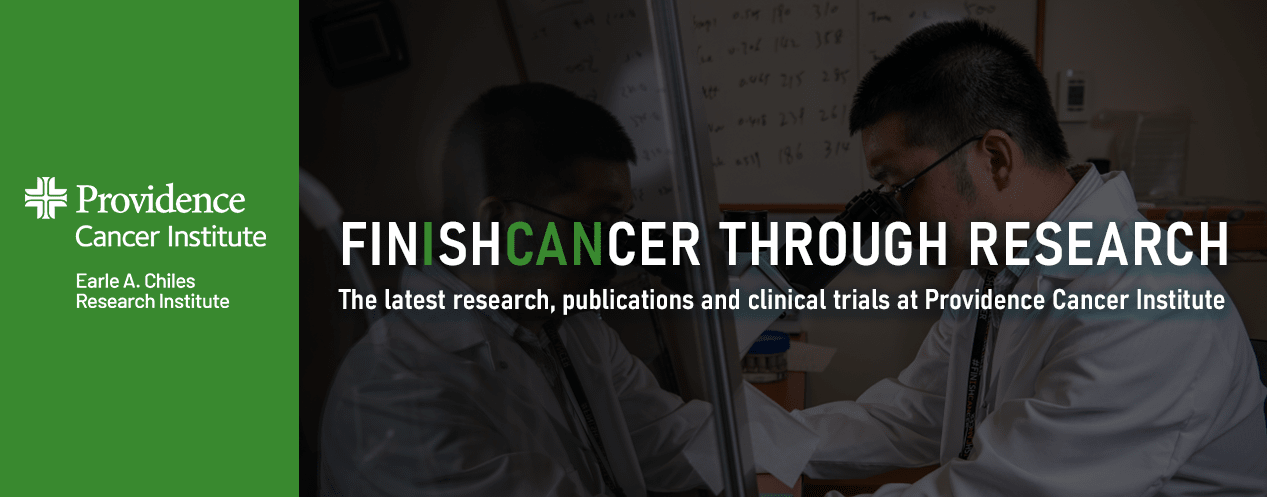
Key Takeaways
-
Providence Cancer Institute is enrolling patients in a phase III trial testing bleximenib with standard therapy for older adults with newly diagnosed AML.
-
The INAVO123 study is evaluating a new targeted combination for advanced HR+/HER2– breast cancer with PIK3CA mutations.
-
A third trial is investigating sacituzumab tirumotecan, alone or with immunotherapy, for patients with advanced HR+/HER2– breast cancer who have limited treatment options.
Providence Cancer Institute is actively enrolling patients in three innovative clinical trials targeting some of the most challenging forms of blood and breast cancer. Read on to learn more about the studies and why they matter.
Acute myeloid leukemia (AML) is an aggressive blood cancer that mostly affects older adults. Standard treatment often involves intensive chemotherapy and sometimes a stem cell transplant. But these approaches can be too harsh for many patients over age 65 because of age-related health conditions. For these patients, treatment options are limited.
A new international phase III study is evaluating whether adding an investigational medication called bleximenib (JNJ-75276617) to the current standard of care—azacitidine and venetoclax— may improve survival for newly diagnosed AML patients who are not eligible for intensive chemotherapy.
There are two Providence Cancer Institute sites offering this study in Oregon. Natasha C. Edwin, M.D., is the principal investigator.
How current therapy works
Azacitidine helps the body produce healthy blood cells by reactivating genes that control normal cell growth and function. Venetoclax targets a protein called BCL-2, which cancer cells use to avoid cell death.
Together, these drugs slow or stop leukemia cell growth and encourage healthy cells to return. While this combination can extend survival, many patients eventually stop responding to treatment.
How bleximenib may enhance treatment
Bleximenib is an oral menin inhibitor designed to block the interaction between menin and KMT2A fusion proteins, a key driver of leukemia cell growth.
The study will enroll more than 600 participants worldwide who will be randomly assigned to receive either bleximenib with azacitidine and venetoclax or a placebo with the same standard drugs. Researchers will measure remission rates, overall survival and how well patients tolerate treatment.
Find out more: Study of Bleximenib, Venetoclax and Azacitidine For Treatment of Participants With Acute Myeloid Leukemia
________________________________________________________________________________________________
A new study, called INAVO123, is testing a new targeted therapy combination for people with hormone receptor-positive, HER2-negative (HR+/HER2–) advanced or metastatic breast cancer that carries a PIK3CA mutation. This mutation is common in this type of cancer and are linked to poorer outcomes and resistance to current standard treatments.
Providence Cancer Institute is currently enrolling patients in this phase III clinical trial.
Why this study matters now
The standard first-line approach, endocrine therapy combined with a CDK4/6 inhibitor, has extended survival for many patients, but most eventually relapse as their disease becomes resistant. Preventing or delaying that resistance remains one of the biggest challenges in treating HR+/HER2– breast cancer.
Researchers are testing whether adding inavolisib, a highly selective PI3Kα inhibitor that specifically targets and degrades the mutant form of the PIK3CA protein, can improve outcomes when combined with the CDK4/6 inhibitors palbociclib and letrozole.
If successful, this approach could redefine first-line treatment for this common form of breast cancer by addressing one of the most significant unmet needs in metastatic disease today.
How the combination works
This triple combination aims to block three key cancer-driving pathways at once: estrogen receptor CDK4/6 and PI3K/AKT/mTOR. Preclinical studies and earlier clinical trials suggest this strategy could delay or prevent treatment resistance and help patients live longer without their disease progressing.
In a prior study (INAVO120), inavolisib combined with palbociclib and fulvestrant more than doubled the time before disease progression compared to standard therapy, with side effects that weren’t too severe.
Building on promising results
The current study builds on those results by testing the regimen earlier in patients whose cancers remain sensitive to hormone therapy. Researchers will evaluate whether this combination can improve survival outcomes and maintain quality of life for patients at higher risk due to the PIK3CA mutation.
Providence Cancer Institute has two sites in Oregon enrolling patients. The principal investigator is Alison Conlin, M.D., MPH, medical director, Providence Breast Cancer Medical Program and High-Risk Breast Cancer Clinic, Providence Cancer Institute.
Find out more about this study: A Study Evaluating the Efficacy and Safety of Inavolisib Plus CDK4/ 6 Inhibitor and Letrozole vs Placebo + CDK4/ 6i and Letrozole in Participants With Endocrine-Sensitive PIK3CA-Mutated, Hormone Receptor-Positive, HER2-Negative Advanced Breast Cancer

Another study at Providence Cancer Institute for people with advanced hormone receptor-positive, HER2-negative (HR+/HER2-) breast cancer is evaluating an investigational medication called sacituzumab tirumotecan. Researchers are evaluating whether this targeted therapy, given alone or in combination with the immunotherapy pembrolizumab, can improve outcomes compared with current chemotherapy options.
Three-arm study approach
The trial includes three treatment groups:
-
Arm A: Sacituzumab tirumotecan alone, given by intravenous (IV) infusion every two weeks.
-
Arm B: Sacituzumab tirumotecan plus pembrolizumab, with pembrolizumab given by IV every six weeks for up to about two years.
-
Arm C: Treatment of physician’s choice, which includes standard chemotherapy options such as paclitaxel, capecitabine or liposomal doxorubicin.
Each participant may receive study treatment for about a year or until their cancer progresses, or they choose to stop.
Meeting an urgent treatment need
HR+/HER2- breast cancer is the most common subtype, representing about two-thirds of all breast cancer diagnoses. While early-stage disease is often treatable, survival rates drop to about 30% once the cancer spreads.
For patients whose cancer progresses after receiving a widely used targeted therapy called CDK4/6 inhibitors, chemotherapy is often the only remaining option. However, its benefits are limited, leaving few effective treatments.
Next-generation therapy with targeted precision
Sacituzumab tirumotecan (MK-2870) belongs to a class of medicines known as antibody drug conjugates (ADCs) that can be described as “smart missiles.” This therapy targets and binds to a protein called TROP2, found on the surface of many tumor cells. Once bound, the cancer cell “swallows” the medication, where a special chemical link connecting the antibody is broken. This reaction releases a powerful chemotherapy that can help stop cancer cells from dividing while minimizing damage to surrounding healthy tissue.
By combining pembrolizumab with MK-2870, researchers hope to boost the immune response and improve treatment outcomes for people with advanced HR+/HER2- breast cancer.
Learn more about this study enrolling patients at Providence Cancer Institute. David B. Page, M.D., is the principal investigator.
To refer a patient:
- Call 503-215-1979
- Send an email
Subscribe to Finish Cancer Through Research newsletter to follow science breakthroughs reshaping cancer care at Providence Cancer Institute.
Related news
Oregon cancer leaders unite to discuss research and policy
Newly retired lung cancer survivor receives advanced treatment close to home
Next generation therapy for men with mCRPC may extend survival





















